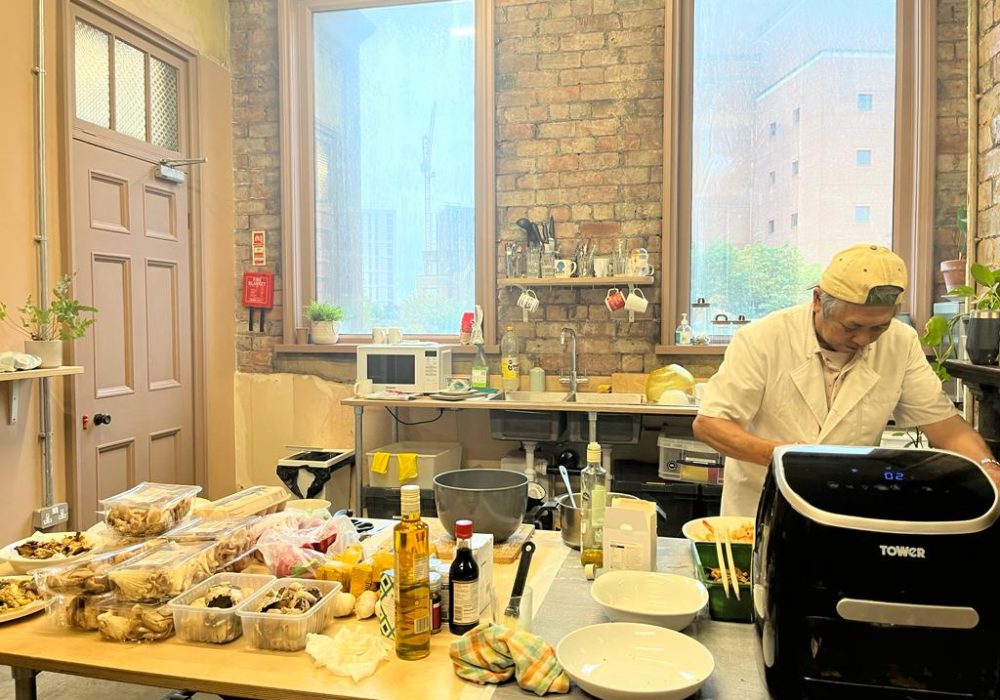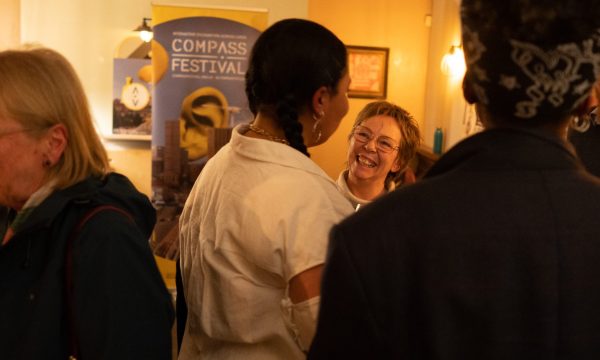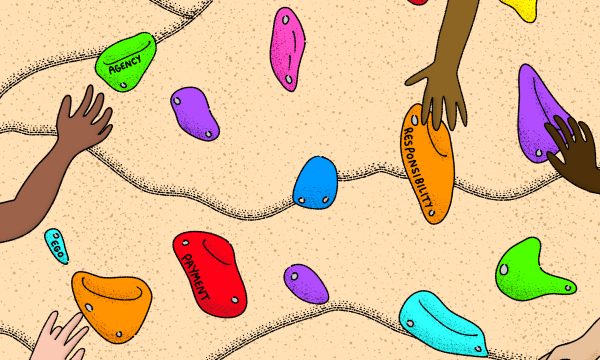Originally commissioned by Kakilang, an East and Southeast Asian arts organisation based in London, ‘Low Carbon Chinatown’ is a project by artist Ling Tan which collaborates with ESEA community members, food writers, chefs, and data scientists to create low carbon versions of traditional Chinese dishes. Earlier this year Compass recommissioned Ling’s work and brought it up north in a series of cooking workshops in August & September 2023 creating Low Carbon Chinatown X Leeds Residency. This page includes reflections on the process from our Trainee Producer Jennie Gilman, as well as photos and videos to share the experience with you.
Photos by Jennie Gilman – captured behind the scenes of the documentary making.
It takes exactly 166 steps to walk to my local Chinese takeaway.
I can smell it before I can see it, its garish magenta and blue neon sign glowing at the end of the row of red brick terrace houses.
Overhead, a Ryanair plane, one of many of the day, makes its regular ascent into the blush pink evening sky from Leeds Bradford Airport. The irony is unmissable.
It’s safe to say that it takes little to no effort to buy my favourite Chinese dishes. Retrace the steps in the making of a beef chow mein dish, however, and the journey becomes a lot more complicated. One serving of Beef (100g) is equivalent to 15.5kg CO2e. Factor in the fuel emissions of each ingredient, not to mention the non-recyclable polystyrene container and plastic bag, and there’s clearly an awful lot to takeaway from a £8.99 meal.
Media-saturated environmental narratives tell us that tackling the climate crisis begins with behavioral changes on an individual and household level. Holding ourselves accountable is a necessary means to affective climate action. But such narratives, combined with the task of getting our heads around all the tricky data, often fail to speak to the many different factors that impact the way we do things in everyday life.
Addressing this tendency for polarising and complicated climate stories, Ling Tan’s short cooking documentary film is the culmination of a Compass Residency 2023 project called ‘Low Carbon Chinatown x Leeds Residency’. In the artists’ own words, the film is an invitation for the audience “to examine how different age, background, heritage, and life experience affects the way people cook food at home and in tackling the climate crisis”.
The diversity of the films’ 4 Leeds residents offer just a small glimpse into a project which engaged with community groups, fellow arts organisations, and individuals from all over West Yorkshire.
Photos by by Jennie Gilman and Charlotte Mereli – captured from the workshops with Lychee Red Chinese Seniors Group and Lincoln Greeners.
A kick-off cooking workshop at Beeston Village Community Centre in August saw members of the public who responded to Compass’ call out join the Lychee Red Chinese Seniors Group, a community group bringing elders together through weekly activities and shared meals. An introductory workshop to the meaning of “carbon footprint” led by Ling was followed by a shared feast of three delicious low carbon dishes; Hainanese chicken & rice, sweet & sour “pork”, and wonton dumpling soup, all prepared by community chef and film participant, Mr Chiu. The languages of the group varied from Cantonese, Mandarin, and English, and the ages ranged from 13-80. Yet the taste of the dishes, and its evocations of “home” and “authenticity” exchanged between strangers during the shared meal, were a testament to the power of food to create sustainability stories which bring people together.
The next day, a collaborative workshop with Mafwa Theatre’s Lincoln Greeners sustainable gardening group was an opportunity for participants to explore and harvest ingredients that can be locally grown and incorporated into their favourite Chinese dishes. The discovery of an unexpected bounty growing in soil donated from a local mushroom farm by group leader, Mathilya, saw oyster mushrooms become the key ingredient in the groups’ co-creation of a low carbon salt and pepper prawn dish. And such sharing of resources and meaningful partnerships with fellow arts organisations, one of the projects’ guiding principles.
On a cosy Saturday afternoon in September, the group gathered at Patrick Studios to share a final meal together. Mr Chiu, characteristically unscathed by the prospect of preparing a meal for a large hungry group, took to the kitchen to prepare his version of the salt & pepper prawn recipe. The afternoon took the form of a projected video call with data scientist, Raphael, and a private screening of Ling’s film. Platters piled high with salt and pepper “prawns” were passed around and bowls were filled with hot, steamy rice. After second, third, even fourth helpings of the dish, the conversation naturally gave way to a collective reflection on Ling’s residency project. It was clear that the project yielded different learning opportunities for each person.
For some, it was a chance to reignite a lost love for cooking. For others, it forged a reconnection with their own Chinese heritage. As Haojin Wang poignantly says in her film interview, “every time we eat Chinese dishes, it feels like home”.
For me, it was an important, personal lesson that producing a project which relies on public engagement is nothing without the kindness and openness of its collaborating organisation leaders. Together, the groups’ experiences testify to the deep interconnections between food, heritage, and the environment, and the many lenses that sustainability stories can, and should, be read through.
Film by Skye McArthur – footage captured during the final meal.



